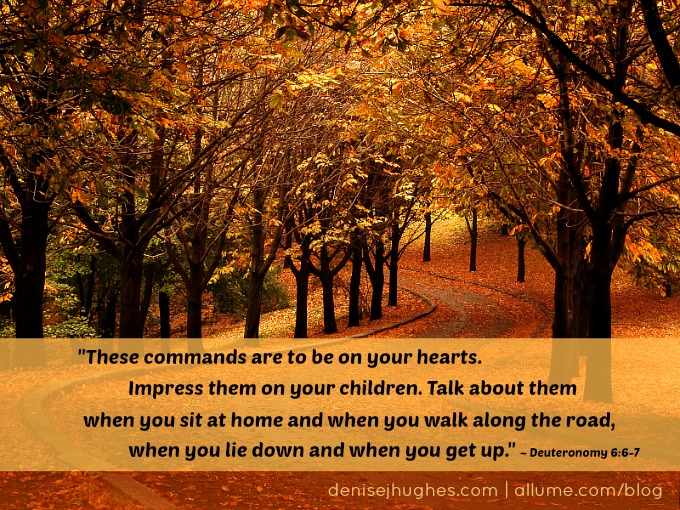When my youngest children were four and five, I wanted them to memorize the famous “Love” passage from 1 Corinthians 13:4-8. So I made a poster using a different color for each phrase
First, we focused on the red words:
Love is patient, love is kind. It does not envy, it does not boast.
Then, we moved to the orange words:
It is not proud, it is not rude. It is not self-seeking.
We proceeded in this colorful fashion until my kids memorized the entire passage. We called it the “First Corinthians Game.”
One morning, while gathering laundry at the top of the stairs, I heard my son say to his big sister, “Let’s play First Corinthians!”
His sister responded with a bored voice. “No thanks.”
Undeterred, he said, “Okay. I’ll do it.”
I stopped to listen and savor the moment.
In his tender four-year-old voice, he began. “Love is patient, love is kind. It does not envy, it does not boast, it is not proud. It is not self-seeking.”
His sister interrupted, “‘It is not rude.’ You’re supposed to say, ‘It is not rude.’”
He accidentally skipped that phrase. But he shouted back, “No! It is not self-seeking!”
She yelled again, “No! It is not rude!”
Their skirmish escalated, and my maternal moment of bliss ended. I had to march downstairs and break it up. Their words to each other were neither loving nor kind. Obviously, they missed the point.
Later, I couldn’t help but laugh at the irony.
Sometimes we work so hard at getting it “right” that we miss the point too. Reading the Bible is about transformation, not information. It’s about imprinting God’s Word on our hearts that we might love others with the same compassion Christ has shown us.
As much as I love to study God’s Word and memorize life-giving passages, I know a mere recollection of Bible verses isn’t enough. The Truth of Scripture must burrow deep into my soul, yielding a harvest of genuine service for Him.
At the end of my days, I don’t want to be known as someone who acquired head-knowledge without heart-compassion. I want to be someone who loves the way Jesus loves. And I want to teach my children to do the same. We still practice our memory verses. But we also talk about the meaning of those verses and how we can apply them to our lives.
Here are seven ways to help kids memorize Scripture:
1. Select one longer passage instead of many short memory verses.
The short weekly memory verses from Sunday School lessons are fine, but they usually reside in a person’s short-term memory. By the following week, they’re easily forgotten when it’s time to learn a new verse. Shorter verses are also more difficult to retain because they’re not attached to something larger.
We learn by association. So when we tackle a larger segment of Scripture, one section at a time, we stay focused on the same passage for a longer period of time, which supports retention in a person’s long-term memory. The children’s ministry at my church devotes every six months to learning one passage. Last winter, it was 1 Corinthians 13:4-8. This spring and summer, the memory passage is Psalm 23.
2. Make a poster and give each section a different color.
Create line breaks to denote appropriate pauses. It’s much easier to absorb individual lines than one solid paragraph. This helps visual learners, especially when each line is assigned a specific color.
3. Create a pathway through your home and assign each line of the passage to a specific room or location in the house.
Start with the front door. When your child enters, have the first verse presented on one 8 ½ x 11 sheet of paper. Let the child color the page. Then frame it. Set the framed words where they’re visually prominent. Then travel along a predetermined path — perhaps through the living, kitchen, dining area, and hallway — and end at your child’s bedside table or shelf. This helps physically active kids move through the house, associating each section of the passage with each sequential location. Each verse becomes a part of the house for the duration of the whole project. This especially helps kinesthetic learners.
4. Put the words to music.
It could be a new melody your child makes up, or it could be a tune as familiar as “Row, Row, Row Your Boat.” Sing the passage together while driving in the car or walking around the block. This especially helps auditory learners.
5. Add motions to your song, or make it a cheer.
The more we engage our bodies, the more our minds have to pay attention.
6. Make a book.
It doesn’t have to be anything fancy. Staple a few sheets of blank white paper together. Have your child write each verse from the passage on a separate sheet. Then draw a picture on each page that tells a visual story. Read the book often and admire your child’s artwork. Your child will associate each verse with the picture he/she drew and remember the sequence of the visual presentation.
7. Take turns reciting the passage before going to bed.
Kids are famous for wanting one more glass of water or one more hug before bedtime. The presence of their parents is comforting. When my kids were little and wanted to cuddle before going to sleep, I’d lie next to them in bed, and we’d take turns practicing our memory passage. They knew the routine. It wasn’t time to chat about the day. Once they finished their turn, they’d close their eyes and fall asleep while listening to Mom quietly recite the same passage.
Kids learn by example. And memorizing Scripture is something the whole family can do together. Then it becomes a central teaching focus for several months.
What helps you memorize Scripture?
Writing for Him,
Denise
TWEETABLES:
“Reading the Bible is about transformation, not information.” <–Tweet this!
“Seven Ways to Help Kids Memorize Scripture: Something the Family Can Do Together.”<–Tweet this!
“The Truth of Scripture must burrow deep into our souls, yielding a harvest of service for Him.” <–Tweet this!

